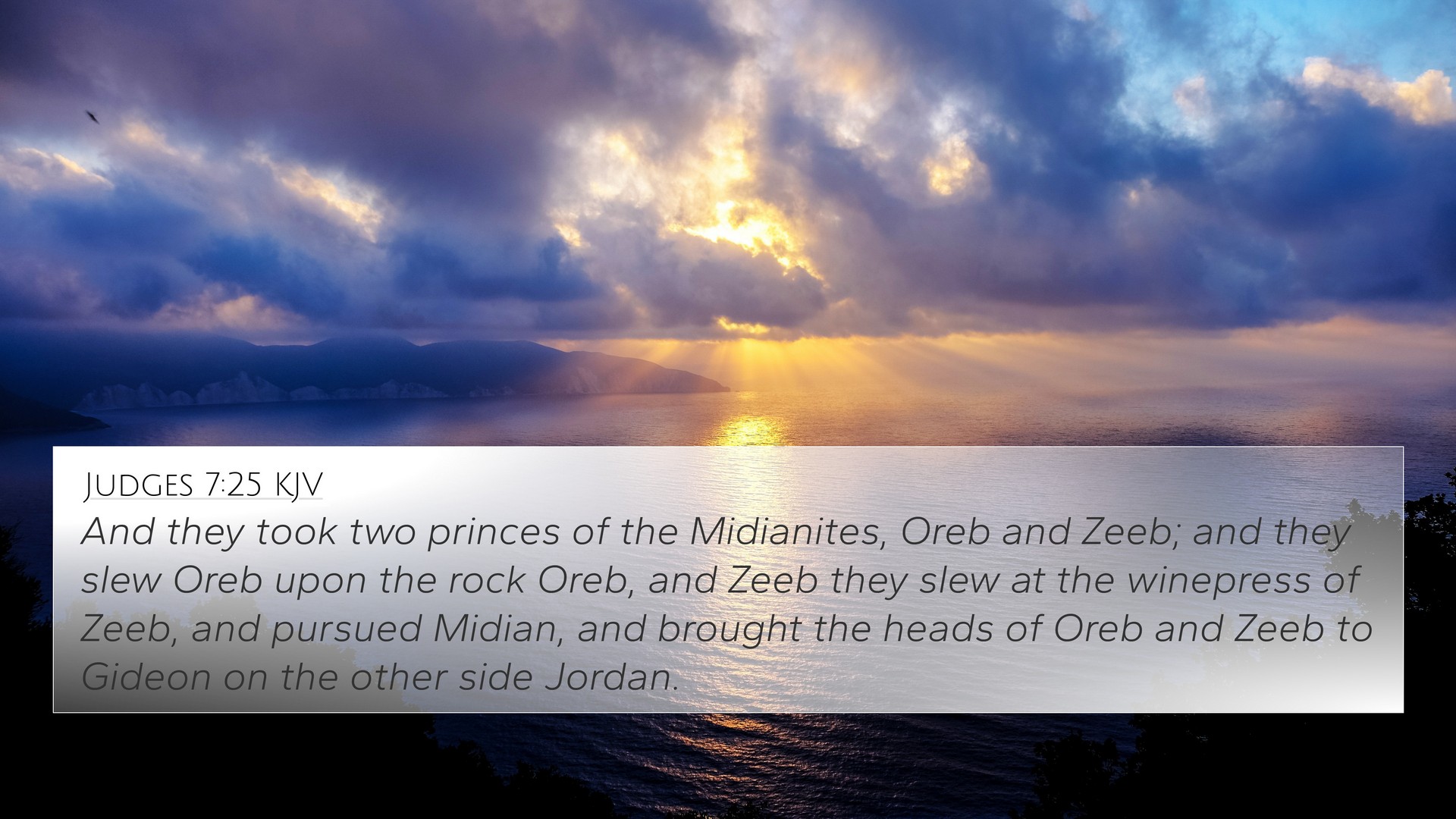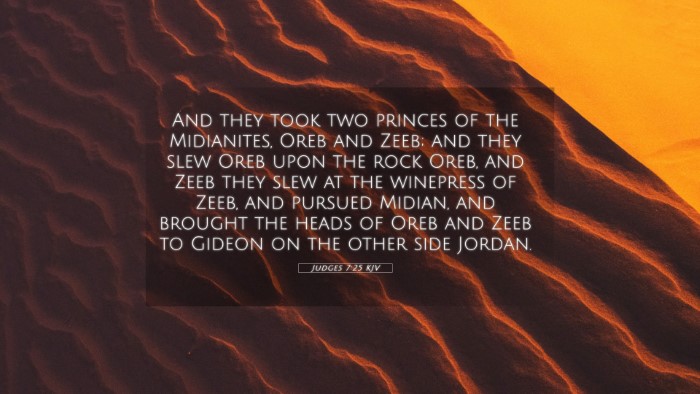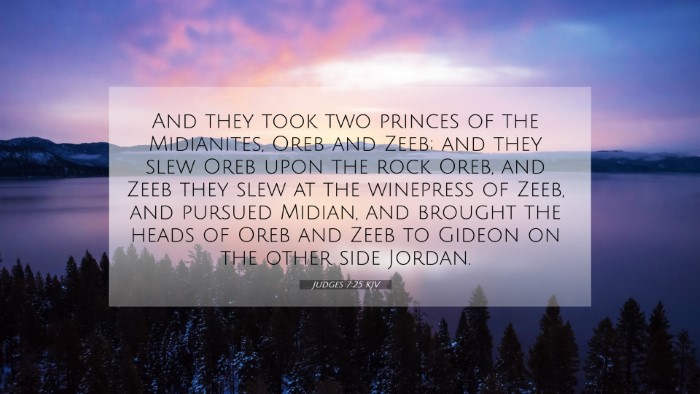Old Testament
Genesis Exodus Leviticus Numbers Deuteronomy Joshua Judges Ruth 1 Samuel 2 Samuel 1 Kings 2 Kings 1 Chronicles 2 Chronicles Ezra Nehemiah Esther Job Psalms Proverbs Ecclesiastes Song of Solomon Isaiah Jeremiah Lamentations Ezekiel Daniel Hosea Joel Amos Obadiah Jonah Micah Nahum Habakkuk Zephaniah Haggai Zechariah MalachiJudges 7:25 Similar Verses
Judges 7:25 Cross References
And they took two princes of the Midianites, Oreb and Zeeb; and they slew Oreb upon the rock Oreb, and Zeeb they slew at the winepress of Zeeb, and pursued Midian, and brought the heads of Oreb and Zeeb to Gideon on the other side Jordan.
Uncover the Rich Themes and Topics of This Bible Verse
Listed below are the Bible themes associated with Judges 7:25. We invite you to explore each theme to gain deeper insights into the Scriptures.
Judges 7:25 Cross Reference Verses
This section features a detailed cross-reference designed to enrich your understanding of the Scriptures. Below, you will find carefully selected verses that echo the themes and teachings related to Judges 7:25 KJV. Click on any image to explore detailed analyses of related Bible verses and uncover deeper theological insights.
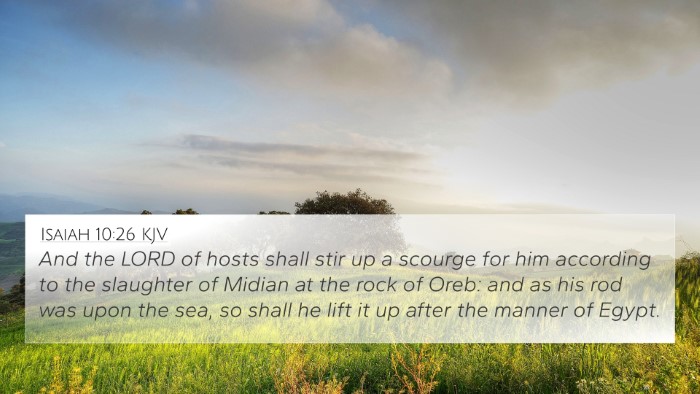
Isaiah 10:26 (KJV) »
And the LORD of hosts shall stir up a scourge for him according to the slaughter of Midian at the rock of Oreb: and as his rod was upon the sea, so shall he lift it up after the manner of Egypt.
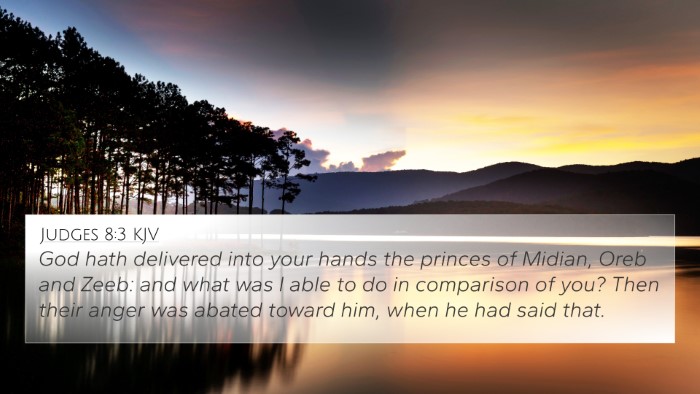
Judges 8:3 (KJV) »
God hath delivered into your hands the princes of Midian, Oreb and Zeeb: and what was I able to do in comparison of you? Then their anger was abated toward him, when he had said that.
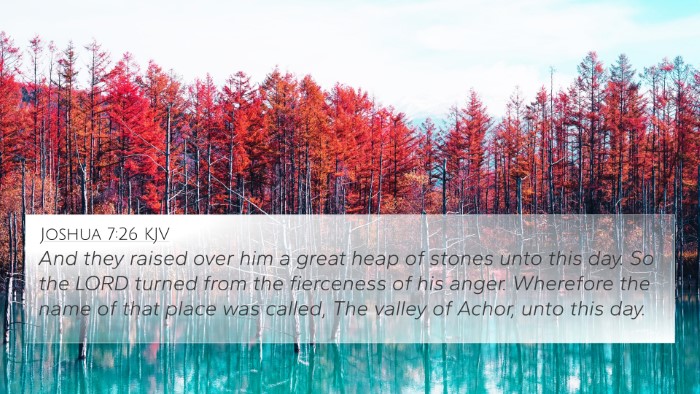
Joshua 7:26 (KJV) »
And they raised over him a great heap of stones unto this day. So the LORD turned from the fierceness of his anger. Wherefore the name of that place was called, The valley of Achor, unto this day.

Psalms 83:11 (KJV) »
Make their nobles like Oreb, and like Zeeb: yea, all their princes as Zebah, and as Zalmunna:
Judges 7:25 Verse Analysis and Similar Verses
Understanding Judges 7:25
The verse Judges 7:25 states:
"And they took two princes of the Midianites, Oreb and Zeeb; and they slew Oreb upon the rock Oreb, and Zeeb they slew at the winepress of Zeeb, and pursued Midian, and brought the heads of Oreb and Zeeb to Gideon on the other side Jordan." (Judges 7:25, KJV)
This passage occurs in the context of Gideon's victory over the Midianites, highlighting the swift justice delivered against the enemies of Israel. The actions described reveal a multi-layered significance that combines themes of divine intervention, military strategy, cultural practices, and theological implications.
Insights from Public Domain Commentaries
Matthew Henry's Commentary
Matthew Henry emphasizes the divine providence at work in Gideon's triumph. The capture and execution of Oreb and Zeeb symbolize complete victory. Henry suggests that this act serves not only as a demonstration of God's power but also as a warning to enemies of Israel. The symbolism of bloodshed attracts attention toward the seriousness of divine judgment against oppressors.
Albert Barnes' Notes on the Bible
Albert Barnes notes that the events surrounding Oreb and Zeeb's deaths served to instill fear among the remaining enemies. The decisive victory bolstered the morale of the Israelites, showing the effects of unity and God’s direct involvement in their success. Barnes connects this incident with the broader narrative of God’s deliverance of Israel from oppression, symbolizing the liberation from bondage through strength and faith.
Adam Clarke's Commentary
Adam Clarke focuses on the geographical and historical context of the event. He explains that the locations mentioned, "the rock Oreb" and "the winepress of Zeeb," have significance relating to the enemies' downfall. Clarke emphasizes that the taking of heads serves as a traditional form of victory that communicates the total defeat of one’s enemies, validating the role of Gideon as a divinely appointed leader and judge in Israel.
Bible Cross-References
This verse relates to several significant passages throughout the Bible that echo its themes:
- Judges 6:12-16 - The calling of Gideon.
- Judges 8:19 - Gideon confronting his enemies' idolatry.
- Isaiah 10:26 - The Lord's judgment upon oppressors.
- Psalms 83:11 - A cry for divine assistance against enemies.
- 2 Corinthians 10:4 - The spiritual warfare principle that our weapons are divine.
- Hebrews 11:32-34 - Celebrating Gideon among the heroes of faith.
- Romans 16:20 - Assurance of God's ultimate victory over evil.
- 1 John 5:4 - Faith that overcomes the world.
- Exodus 15:6 - The Lord is a warrior; the Lord is His name.
- Psalm 44:5 - Victory through God, trusting in His might.
Thematic Connections
This passage is rich in thematic connections throughout the scriptures:
- Divine Intervention: Judges 7:25 teaches that God actively participates in the deliverance of His people, which is echoed in many stories within both the Old and New Testaments.
- A Call to Arms: Similar narratives exist where God raises up leaders (like Deborah or David) to defeat oppressors, spotlighting themes of courage informed by faith.
- Justice and Retribution: The execution of adversaries serves as a precedent in ancient judgments, emphasizing God's opposition to evil across biblical history.
- Symbols of Victory: The act of cutting off the heads of enemies taps into a broader biblical motif of ritualized acts of victory, seen in various passages depicting warfare and judgment.
How to Study Judges 7:25
For those seeking deeper understanding through cross-referencing, here are some tools and methods to apply:
- Bible Concordance: Utilize a concordance to find specific terms related to judgment, war, and divine intervention.
- Cross-Reference Guides: Use guides that link this chapter to historical narratives and prophecy.
- Thematic Study: Group together themes found in Judges with those in prophetic writings to understand God's overarching plans.
- Comparative Analysis: Compare with other judges' narratives, such as Samuel and Deborah, to grasp key elements of God's deliverance.
Conclusion
The exploration of Judges 7:25 is a window into the heart of Israel's complex relationship with God, revealing deep truths about faith, obedience, divine judgment, and victory. For readers today, engaging with this text and its cross-references illuminates the timeless nature of divine justice and intervention in our lives.
